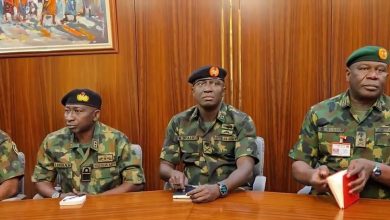Nnamdi Kanu Files New Motion, Seeks Dismissal of All Charges and Immediate Release
Nnamdi Kanu has filed a new motion at the Federal High Court in Abuja seeking to quash all charges against him.
He insists the prosecution relied on repealed laws and unconstitutional grounds.
The detained leader of the Indigenous People of Biafra (IPOB), Nnamdi Kanu, has approached the Federal High Court in Abuja with a new motion seeking to have all charges against him struck out. He also asked the court to order his immediate release, insisting that there is no valid case against him under any current Nigerian law.

In the motion dated October 30, 2025, and titled “Motion on Notice and Written Address in Support,” Kanu argued that the charges filed by the Federal Government lack any legal foundation and are therefore null and void. Acting as his own legal representative, Kanu said the prosecution based its case on repealed and obsolete laws, making the entire proceeding unconstitutional.
He explained that the prosecution relied on the Customs and Excise Management Act (CEMA), which was repealed by the Nigeria Customs Service Act 2023, and the Terrorism Prevention (Amendment) Act 2013, which was replaced by the Terrorism (Prevention and Prohibition) Act 2022 (TPPA 2022). According to Kanu, these repealed statutes can no longer form the basis for any criminal charge.
Kanu’s motion was filed under Sections 1(3), 6(6)(b), and 36(12) of the 1999 Constitution, the Evidence Act 2011, and the TPPA 2022. He argued that Section 36(12) of the Constitution makes it unlawful to try anyone for an offence that is not defined by an existing law. He therefore urged the court to strike out all the charges for failing to meet constitutional requirements.
Referring to the Supreme Court’s ruling in FRN v. Kanu (SC/CR/1361/2022), he maintained that lower courts must take judicial notice of repealed laws as provided under Section 122 of the Evidence Act 2011. He said that ignoring this obligation makes any ongoing proceedings invalid in the eyes of the law.
Kanu also raised questions about jurisdiction, saying that some of the allegations were linked to actions that allegedly took place in Kenya. He argued that under Section 76(1)(d)(iii) of the TPPA 2022, offences committed outside Nigeria must first be validated by a competent court in the foreign country before they can be tried in Nigeria. According to him, the prosecution’s failure to comply with this provision strips the Nigerian court of jurisdiction and violates Article 7(2) of the African Charter on Human and Peoples’ Rights.
He further cited constitutional provisions stating that any law or judicial action inconsistent with the Constitution is null and void. Kanu referred to previous cases, including Aoko v. Fagbemi (1961) 1 All NLR 400 and FRN v. Ifegwu (2003) 15 NWLR (Pt 842) 113, where convictions based on non-existent laws were overturned.
In conclusion, Kanu requested the court to compel the prosecution to respond strictly on points of law within three days and to deliver its ruling on or before November 4, 2025. He said his application raises only constitutional and legal issues, making the filing of an affidavit unnecessary.
The court is expected to fix a date for hearing on the motion as Kanu continues to challenge the legality of the charges brought against him by the Federal Government.



